When movie magazine TotalFilm visited the set of Once Upon a Time...in Hollywood, their reporter bore witness to a strange sight: Quentin Tarantino in plastic fangs and a cape, twisting along to the sounds of "Monster Mash."
Oh, God, how could that possibly fit into the movie? Isn't it enough that we had to endure Tarantino's Australian accent in Django Unchained? What, is he now playing some kind of monster movie host in Once Upon a Time?
Nope. Mercifully, Tarantino stays entirely off camera. What TotalFilm saw was actually an on-set party, part of a long-standing Tarantino tradition where every 100 reels of film on any shoot is commemorated with a themed party. For Once Upon a Time, that theme was Halloween, thus Tarantino's fangs and cape. (No word on what costumes any of the cast members might have worn for the party, but I'm thinking Margot Robbie would make a great Buffy Summers.)
Nobody else does that kind of thing, but Tarantino's entire career has been built around doing the thing no one else would think of. His fans love him for it; the critics, not so much. Moreover, he never asks for permission, forever feeding his own ego and making the movies he wants to see - a Kung Fu action flick with primarily non-Asian leads, a Jewish WWII or black slave trade revenge fantasy - without ever thinking if he truly has the right to be the one to make them.
When or if he finally retires, he'll leave behind a complicated legacy, particularly as the reality of how little he did to stop a monster like Harvey Weinstein off-screen contrasts with his on-screen fantasies of female empowerment. However, on more than one occasion Tarantino changed the face of film history forever, and despite Hollywood's predictable run of copycat projects no one ever has nor likely ever will be able to do it quite like him.
From his crime story beginnings through his genre pastiche middle period to the revisionist histories he's been spitting out for the past decade, Tarantino has unleashed 13 movies, 10 of which he directed. You've already seen how I'd rank #'s 13- 5. Now, finally, I reveal my top 4:
4. Pulp Fiction (1994)
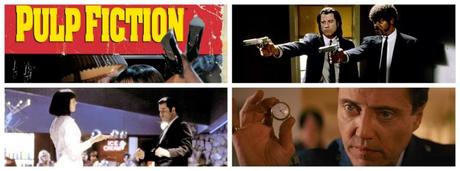
What It's About: Told in non-linear, jumbled fashion, Pulp Fiction chronicles a couple of days in the lives of Los Angeles criminal underworld figures, including two hitmen (John Travolta, Samuel L. Jackson) headed for divorce, a past-his-prime boxer (Bruce Willis) asked to take a dive, and a cocaine-snorting actress (Uma Thurman) turned mob wife.
Backstory: The idea for Pulp Fiction had been percolating in Tarantino's head since his Video Archives days. From behind the video store counter, he mulled over a possible anthology film with interlocking stories in the mold of Fernando Di Leo's "Milieu trilogy," but it wasn't until he was editing Reservoir Dogs that he finally cracked how to do it. Watching the Reservoir gang doing their slow-motion walk at the beginning, he loved the way it played. "These guys don't know they're peripheral characters. As far as they're concerned, they're the stars of the movie, you know?"
Hold on. What if you applied that to an anthology? What if you made an anthology movie where the star of one story becomes a supporting player in the next and then maybe just a peripheral presence in another? What if all these people living as if they are the stars of their own movie have no idea they're all part of the same story?
Fresh with inspiration and flush with cash from Reservoir, which was a huge hit in Europe by early 90s indie movie standards, Tarantino and his pal Roger Avary headed off to Amsterdam to write the script together, expanding upon an earlier idea they had about doing a series of shorts and compiling them together as one film.
Danny DeVito's company Jersey Film offered Tarantino and his producer Lawrence Bender a development deal worth a million, which they took, but due to Jersey Film's commitments that meant Pulp Fiction had to be offered to Tri-Star. Tarantino and Avary's 159-page monster was delivered to them in May 1993, and it didn't go over very well. It's not just that they didn't get it, although that's certainly a factor; it's also that Tarantino gave them a list of demands. He refused to take any notes or make any edits, and he produced a casting sheet which broke down the exact order in which the parts were to be offered to his preferred actors.
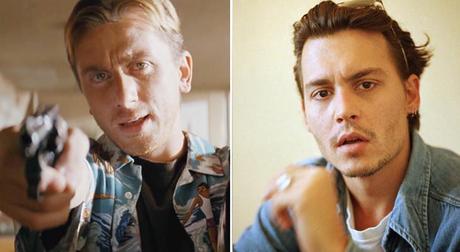
After a meeting in which Tarantino and Tri-Star head Mike Medavoy argued over whether they could offer the part of Pumpkin to Johnny Depp instead of Tim Roth, the studio formally passed. So did everyone else in Hollywood until Bender finally took the script to Miramax, where Reservoir producer Richard Gladstein now worked and agreed to send it up to Harvey Weinstein. To that point, Miramax had been a true indie, but it had just been purchased by Disney. Harvey loved the Pulp Fiction script so much he threw $8.5 million of his new Disney money at it, setting it up to become the first film fully financed by Miramax.
A period of intense negotiation ensued before Miramax agreed to give Tarantino final cut, a two-and-a-half-hour running time, and final say on the actors. Taraintino, in turn, made their lives much easier when he convinced Bruce Willis to be in the movie. His name alone netted Miramax $11 million in foreign pre-sales. Willis only agreed to take the part of Butch the boxer after meeting Tarantino at Harvey Keitel's house and going for a long walk together.
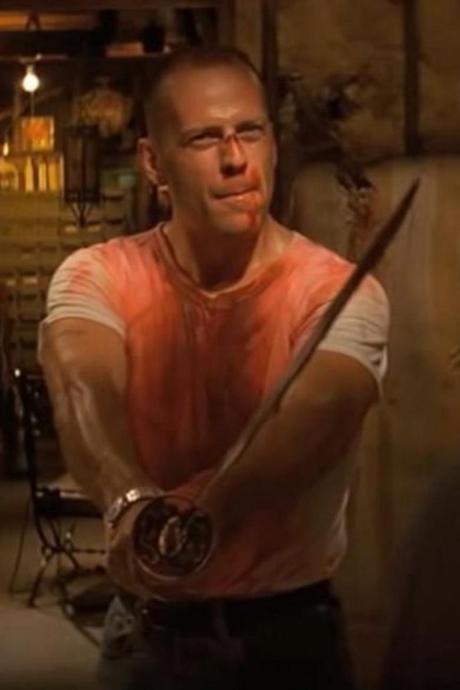
John Travolta had already received a similar amount of one-on-one time with Tarantino, and Uma Thurman would as well. In these early days, it seems, everyone was nervous about Quentin until they met him and were overwhelmed by his personality and savant level of film knowledge.
The rest, from there, is the stuff of film legend. Harvey's ingenious campaigning helped propel Pulp Fiction to winning the Palm d'Or at the Cannes Film Festival. Upon wide release, it became the first independent film to break the $200 million worldwide barrier. Miramax officially became a force in the industry, enabling the further rise of a monster like Harvey Weinstein in the process. John Travolta was instantly welcomed back into the A-list for at least a half decade. The film earned 7 Academy Award nominations and walked away with one win for Tarantino and Avary's screenplay, and all these years later it is currently #95 on the AFI's List of the Top 100 Films of All Time.
Quentin's Take: "I"m not the kind of guy who wants to put Pulp Fiction into perspective twenty years later. One of the things I'm proudest about is that I went out to make an omnibus movie. Three separate stories. Then I wanted to make it so it would actually work together to tell one story. And I did that."
My Take: A consensus pick for instant classic, there were still some dissenting opinions about Pulp Fiction back in 1994. Kenneth Turran wrote in The La Times, "A gifted mimic who knows how to make lively collages out of movie history, Tarantino seems unconcerned that his films feel more like heartless dead-ends than an opening to something new and involving."
Similar charges were leveled against the director after Reservoir Dogs and continue to be to this day. Is he a brilliant remix artist? Or a rip-off scammer who just makes collages of other movies and calls the finished product his own? Is it all just surface-level pizzaz without any real human depth? Once you pick up on all of his storytelling tricks and move past his fire hydrant dialogue, what else is there?
The question, though, is when is the last time you actually watched Pulp Fiction? For me, it had been decades, and upon rewatching it for this list I was struck by how well the film still generally works, how much I didn't remember, and what hasn't aged well.
Still works? Anything involving Travolta, Jackson, and/or Thurman.
Didn't remember? Willis' scenes really drag and he's actually quite ill-suited to Tarantino's dialogue.
Hasn't aged well? Jimmy and his endless n-words.
It's that last part which gives me the hardest time now. Tarantino shows up halfway through the film to play Jimmy, a character who exists just to endlessly drop n-bombs but get away with it because his black friend never corrects him AND his wife turns out to be a black woman. It felt needless and excessive back then; even more so now.
Favorite Scene:
There are so many quotable lines and memorable speeches in Pulp Fiction. It's to the point that it's almost uncool to name one of the obvious ones. "No, don't pick Jules' Bible verse speech. Everyone always picks that." Yeah, they do because it's peak Samuel L. Jackson!
3. Jackie Brown (1997)
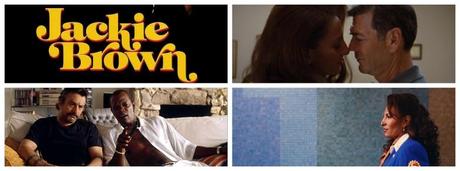
What It's About: A 44-year-old flight attendant (Pam Grier) and an even older bail bondsman (Robert Forster) conspire to con both the cops (Michael Keaton) and a low-rent arms dealer (Samuel L. Jackson) out of a hundred grand.
Backstory: After Tarantino dropped out of high school at the age of 15, he kept getting into trouble with the law. On one occasion, he shoplifted the Elmore Leonard novel The Switch at a KMart. Getting caught for the crime resulted in a grounding from his mom, but the novel lit a fire inside of him and led him straight to drama school. This literal theft of Leonard's work would soon lead to something far more metaphorical as Tarantino's early scripts, True Romance in particular, were consciously written to emulate Leonard's prose.
After Pulp Fiction's immense success, things changed, and The Weinsteins swooped in to not only buy up Rum Punch but also Killshot, Bandits, and Freaky Deaky. Quentin could do whatever he wanted with any of them, but after re-reading Rum Punch, "I saw the same movie in my head I saw the first time I read it. It just came back again. I thought, I want to do this."
The movie he saw in his head differed in one big way from Rum Punch: he wanted to take one of the supporting characters - a 44-year-old white flight attendant named Jackie Burke - and race-switch her while also making her the star. Moreover, he knew just the right actress for the part: Pam Grier.
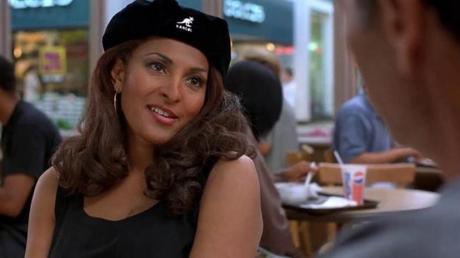
She didn't believe him, and when the script was finished and sent to her it got caught up at the post office since Quentin hadn't paid enough postage. By the time Grier finally go it, they'd been waiting three weeks to hear back and took her silence to mean she was passing on the project. She wasn't passing, exactly, but upon reading the script she assumed they wanted her for the part of the black guy's floozy girlfriend. Not the most challenging or rewarding work in the world, but she was happy to audition. "Bridget Fonda is playing Melanie," Tarantino patiently explained. "You're Jackie Brown, Pam. I told you I was writing a script for you. I loved Foxy Brown, and I wrote this in your honor." No audition necessary.
Quentin's Take: "I wasn't trying to top Pulp Fiction with Jackie Brown. I wanted to go underneath it and make a more modest character study movie."
My Take: When I think about the films of 1997, I always go straight to Boogie Nights, Paul Thomas Anderson's shotgun blast to the face of pure cinematic showmanship with one Steadicam sequence after another designed to one-up Goodfellas. Yes, '97 was also the year of Titanic, As Good As It Gets, Good Will Hunting, and L.A. Confidential, all of them solid but all of them made by veteran directors. There's always just that extra bit of energy and moxie from the work of a young director making his first or second movie, exploding onto the scene with complete creative abandon. That's what Paul Thomas Anderson is doing during every single minute of Boogie Nights, mixing a clear love for the LA of his youth with a morbid fascination with the sad life of John Holmes and creating magnum opus in the process.
I always forget, however, that Jackie Brown also came out in 1997. It's not a showy movie like some of the others from that year, and that's by design. Tarantino had already done his loud, attention-grabbing movies. The world would have been perfectly happy to see him stay on that same trajectory and make another Pulp Fiction. Instead, he ran in the complete opposite direction, dropping all of the cinematic tricks of his first earlier work and challenging himself to make a grounded, mature character study, exactly the type of thing audiences wouldn't have expected from him for at least another decade.
As a result, his Jackie Brown is a bit of a meandering hangout movie which gradually builds to a subdued crime caper and culminates with a kiss between two characters whose combined age is over 100. It's the type of work you don't totally appreciate until you're actually closer in age to the characters in the movie, at which point all the talk of fat asses, hair plugs, and quickly closing life opportunities resonates. I didn't get this movie in '97; I really do now and relate to the seasoned emotion Grier and Forster bring to the table.
Before this, Tarantinto wrote scripts about characters whose lives happen to eventually collide with movie tropes. In Jackie Brown, his characters are more leisurely aware of the movies but have no idea how to actually transfer any of that to reality. Samuel L. Jackson's Ordell, for example, is a loud-mouthed criminal who is repeatedly said to just be modeling his behavior off of stuff he's seen on TV, yet at the end when he walks into an obvious trap plucked straight out of a cop movie he has no idea how to respond. It's a far cry from Jules in Pulp Fiction, a true bad motherfucker from beginning to end.
That kind of maturity and clever deconstruction is why Jackie Brown is the Tarantino movie which has risen the most in critic's eyes in the years after its release. It's gotten to the point where it's now almost a cliche to pick it as his true best movie. Jackie Brown, after all, fits a familiar "misunderstood or underappreciated classic" narrative. I can't quite go that far. Jackie Brown is certainly the Tarantino movie I feel the most, but there are two I like even more.
Favorite Scene:Only Samuel L. Jackson could somehow manage to talk a victim into getting into the trunk of his car without suspecting anything weird is afoot.
2. Kill Bill: Vol. 2 (2004)
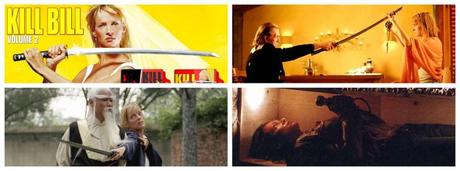
What It's About: The bride's revenge quest turns even more personal than she expected.
Backstory: Kill Bill almost got away from Tarantino. Since he'd never made a movie like it before, he didn't totally know what he was doing and his decision to forego using storyboards or shotlists in favor of an improvisational style only added to the drama. Arguments were a daily occurence and word got out to the rest of Hollywood that Tarantino and Miramax had a fiasco on their hands. And that was before Uma Thurman's car crash which Miramax kept secret for years.
When the production entered its third month of shooting in China even though it had only been scheduled to be there for just over 20 days, Harvey Weinstein finally had enough. He boarded a flight to Beijing to see what the hell was going on. By the time he flew back to the States, he'd seen Sally Menke's rough cut of everything Tarantino had shot so far and loved it so much he told them to just keep on doing what they were doing. Everything looked amazing, but there was so much of it that the movie clearly needed to be cut in half. Weinstein would worry about moving the money around and preparing to market and distribute two movies instead of one; they just had to finish the shoot.
"Very early on, we started talking about it being split in two, so it wasn't a surprise [when Harvey Weinstein gave us the ok], given the quantity of the scenes," Menke admitted. "I have to say it was a relief. It meant we could get everything in that we loved so clearly, rather than going, 'Ohhh. We have to see that go."
That's what saved Menke and Tarantino from having to lose too much from Kill Bill 1 & 2, but they would eventually put together a supercut entitled Kill Bill: The Whole Bloody Affair. Tarantino screened it at his theater, The New Beverly, on his 48th birthday. It has never been released for sale.
Quentin's Take: "I wrote a movie I wanted to see. I make my movies for my fans but I considered myself the biggest fan. So I make it for me and everyone else is invited."
My Take: When Warren Beatty was still waffling about whether he wanted to be a part of Kill Bill, he offered Tarantino a hypothetical: "What would your answer be if somebody were to ask, 'What stops [ Kill Bill] from just being one fight after another where each one tops the last one?'" Tarantino's response: "A kung-fu film with a lot of great fights, and each one is better than the last? That's what I'm going for, and if I do it, I will be very happy!"
Disappointing to some, sure, but the most thrilling section of the whole saga actually happens right before that. Bill and The Bride actually sit down and talk, albeit not entirely voluntarily - he does drug her, after all. Still, Tarantino's greatest weapon remains his words, and they are deployed with lethal precision as Bill and The Bride hear each other out. By the time you've heard his explanation, you don't know if you really want to see her kill him. Yet, you're still rooting for The Bride and care deeply for her redemptive arc. It's just that a fairly straightforward story of revenge got complicated.
Favorite Scene:Uma's conflicted cry/laugh says it all.
1. Inglourious Basterds (2009)
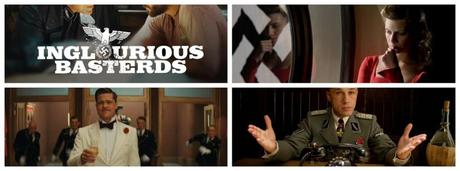
What It's About: A group of Nazi-hunting Americans (led by Brad Pitt) team up with British intelligence officials (led by Michael Fassbender) during WWII to plot an assassination attempt on the leaders of the SS. Little do they know that a French Jewish movie theater owner (Melanie Laurent) has similar plans or that a loquacious, brilliant, but brutal SS colonel (Hans Landa) is on to them.
Backstory: When Ethan Hawke, Uma Thurman's husband at the time, first read the script for Kill Bill, he turned to Tarantino and said, "Quentin, if this is the epic you're doing before you do your epic, I'm afraid to see your epic."
That's because at some point in the distance beyond Kill Bill Quentin already had his true epic in mind. He'd been hacking away at a sprawling WWII script since 1998, but it was getting away from him. He shelved it to work on Kill Bill and Death Proof, but when he pulled it back out he still couldn't wrestle it down to something manageable. Overflowing with ideas and swelling in length, he didn't even know if it could be done as a movie. Maybe a 12-part miniseries would work better.
A dinner with French film director Luc Besson set him straight. Upon hearing Tarantino might give up on his movie epic and port it to TV instead, Besson scolded, "I'm sorry, you're one of the few directors who actually makes me want to go to the movies, and the idea that I might have to wait for five years to go into a theater and see one of your movies is depressing to me."
Six months of editing later, Tarantino had his Inglourious Basterds script, pared down to a Dirty Dozen-style actioner about guys on a mission mixed with the thrilling adventure and humor of WWII-era propaganda pictures like Man Hunt and This Land is Mine. Lawrence Bender and everyone else around Tarantino could hardly believe he'd finally finished the thing, but once they wrapped their minds around it production kicked into high gear to make the deadline for Cannes 2009. The only thing capable of slowing them down was Hans Landa.
Leonardo DiCaprio was interested in the part, but Tarantino insisted that they cast a native German speaker who could also convincingly converse in French, Italian, and English. Without such authenticity, the character wouldn't work, but deep into the casting process they had yet to find such a rare creature. Tarantino gave himself one final week to find someone or else he was going to pull the plug on the whole movie. Without the right Landa, there would be no Inglourious Bastards.
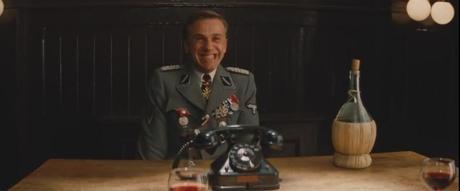
Then Christoph Waltz - a journeyman actor mostly known in his native country for appearing on the stage and playing villains on German TV - walked in and saved the movie.
Still, even with the perfect Landa in tow the production moved faster than Tarantino liked, and he ran out of time to truly finish his cut with Sally Menke before Cannes. The bad reviews out of the festival convinced them they needed to put back in a lot of the stuff they had cut out, like Fassbender meeting the Basterds. They managed to get it just the way they wanted in time for the film's September release. 8 Oscar nominations and the biggest box office figures in Tarantino's career - well, biggest until Django Unchained came along - soon followed.
Quentin's Take: "I was trying to do a spaghetti western but using World War II iconography."
My Take: Tarantino has rarely known failure, and while he did spend a good half decade on the furthest outskirts of Hollywood before breaking through with Reservoir Dogs the days of eating humble pie are far, far behind him. The dude won an Oscar on literally his 32nd birthday and had reporters telling him he was the new Orson Welles but better. The rest of his career has been devoted to trying to earn that kind of insane hyperbole by always striving to one-up himself. Any kind of rejection along that path only motivates him more.
Don't like Jackie Brown? Oh, yeah, here's Kill Bill, motherfuckers.
Didn't dig Death Proof? Well, here's an epic war movie that's only 25% in English and is really just an elaborate series of dueling conversations which will eek out every ounce of tension cinematically possible just from watching people talk. You probably think that description sounds like a terrible idea, but when you see the movie you're going to be blown away!
Indeed, this was another one of those "I can't believe someone was allowed to do this" viewing experiences, a Tarantino specialty. They let him open a WWII movie with a 20-minute conversation between a German and a Frenchman hiding some Jews under a floorboard? Then when Brad Pitt shows up, you wonder, "Are they allowed to make WWII funny?" By the end, you can't believe they actually killed Hiter, and while it is such an audacious, Quentin thing to do to have one of his characters end the movie declaring "this might just be my masterpiece" you can hardly disagree with the sentiment.
Inglourious Basterds kickstarted Tarantino's new literary period, a time when all of his movies could very well have ended up as novels instead and some almost did. For me, he's yet to do it better than he did with Inglourious. It remains the crowning achievement of his entire career.
Favorite Scene:Hans Landa as acting coach cracks me up every time.
So, to recap, here's my total list:
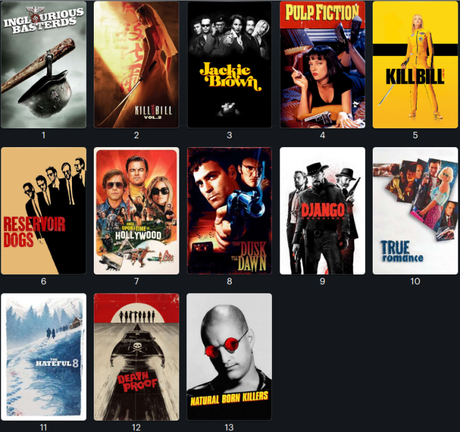
Sources: Empire July 1, 2019,Tom Shone's Tarantino: A Retrospective
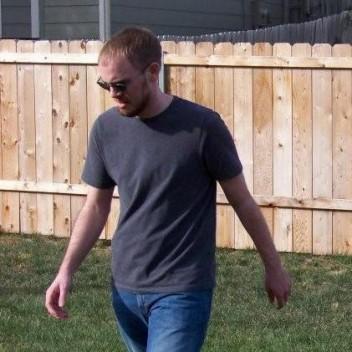
Grew up obsessing over movies and TV shows. Worked in a video store. Minored in film at college because my college didn't offer a film major. Worked in academia for a while. Have been freelance writing and running this blog since 2013. View all posts by Kelly Konda

